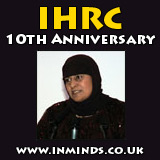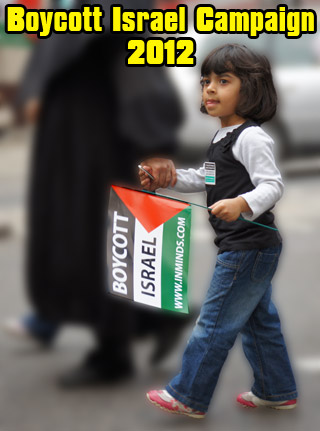
 Innovative Minds © 2014. All Rights Reserved. www.inminds.co.uk | ||||
For Gaza's students, classes by 'remote control'Tamara Traubmann, Haaretz
Shaima Naji, a 21-year old from Gaza, has never attended classes at Bethlehem University where she is enrolled to study occupational therapy(OT). Naji registered at the university four years ago, but security forces forbade her entry into the West Bank..
Shaima Naji, a 21-year old from Gaza, has never attended classes at Bethlehem University where she is enrolled to study occupational therapy. Naji registered at the university four years ago, but security forces forbade her entry into the West Bank. Occupational therapy, commonly called OT, has become a vital aspect of rehabilitative treatment in the Gaza Strip since the intifada began, but Naji may only receive professional training in Bethlehem because there is no similar course of study in the Gaza Strip. Naji's inability to attend class represents only one aspect of a larger problem, the Israeli defense system's sweeping prohibition of movement of Gaza Strip students and residents into the West Bank - despite the fact that many of them do not represent a security risk. Israel imposed this broad ban on movement at the inception of the Al-Aqsa Intifada in 2000. Tomorrow, more than 250 academics and lecturers from universities throughout Israel will submit a petition to the prime minister and the defense minister demanding that students from the Gaza Strip be permitted to attend institutions of higher learning in the West Bank, based on the outcome of individual security examinations. Normally, OT certification requires many hours of clinical experience but Naji and nine other Gaza students have been forced to train by "remote control." First, they attended courses in Wafa Hospital and the Islamic University of Gaza. Later, Norwegian lecturers arrived in Gaza to conduct classes. During the third year, according to Mohammed al-Azaizeh, another student in the course, "The situation in Gaza deteriorated. Foreign lecturers couldn't come because of warnings from their embassies." At some point, he says, classes ceased for three months. Students also traveled to Egypt to receive some of their practical training, but the cost of staying in Egyptian hotels was limiting. When they returned, they listened to lectures provided by Bethlehem University by means of video-conference call. But according to Naji, "There are technical problems during class. We can't talk to lecturers. We use the Internet to ask them questions." Four days ago, their fourth-year term opened. Azaizeh, age 24, from Dir al-Balah, says classes take place at the Al-Aqsa University in Gaza. But according to him, some courses are taught via the Internet, on home computers, but the Israel Defense Forces bombing of the central Gaza Strip power station, in June, and subsequent power outages, disrupted these courses. Azaizeh says all the students suffer financial difficulties and require the assistance of grants. Grave needThe need for occupational therapists in the Gaza Strip is grave. The disability rate is high: 1.7 percent of the population (or about 24,000 individuals). Most of this disability results from disease, accidents, IDF bombing and shelling and crime. But, to date, there is only one trained occupational therapist in Gaza. The only place in the Palestinian Authority where residents may study OT is Bethlehem University. Students' requests to travel to Bethlehem were denied despite the fact that Israel has not maintained that they pose a risk to security, in the majority of cases. Naji and Azaizeh lack many hours of clinical experience and they do not know how they will complete them. "Maybe, we'll travel to Cairo," Naji says. "But there are many obstacles in the way. We may not receive an exit permit for Cairo and Israel might close the Rafah border crossing. In any case, we are talking about going for two weeks because we lack money to stay in a hotel. During those two weeks, we will complete a 70-hour course which takes three months at Bethlehem University." According to Naji, "Occupational therapy is a new, unknown field here that is vitally needed. Many wounded people lost body parts in the intifada. We must rehabilitate them so that they can return to their lives and feel normal. They were wounded while attempting to defend themselves and their land. Our job is to help these people and do something for our homeland." The nonprofit Gisha: Center for the Legal Protection of Freedom of Movement in Israel and the Territories initiated the petition signed by Israeli academics. Prof. Kenneth Mann, Gisha's legal adviser, says the petition is exceptional in the history of Israeli academics; although Israeli academics take part in leftist political organizations, they rarely voice common opinions pertaining to human rights issues in the territories as an academic body or as representatives of a public institution. In the past, British academics cited the apathy of Israeli academics to circumstances, including a lack of academic freedom in the territories to justify their attempt to impose an academic boycott on Israel.
According to statistics presented in the appeal by the [israeli] nonprofit organization,Gisha -Center for the Legal Protection of Freedom of Movement, the prohibition caused a decrease in the number of students from Gaza, from 350 to only 35. Additional limits on travel to Egypt prevent an additional few thousand students from attending institutions of higher learning - even after the disengagement.
In December 2005, Gisha and 10 occupational therapy students appealed to the High Court to cancel the sweeping ban to permit students to enter the West Bank. Two Palestinian nonprofit organizations, that require OT to treat Gaza residents, also joined the appeal. The petitioners accept the claim that Israel has a right to protect its security interests but maintain that the sweeping prohibition disrupts the balance between those interests and rights to move freely and study. According to statistics presented in the appeal by the nonprofit organization, the prohibition caused a decrease in the number of students from Gaza, from 350 to only 35. Additional limits on travel to Egypt prevent an additional few thousand students from attending institutions of higher learning - even after the disengagement. In response to the appeal, the state wrote that even if a student does not intend to engage in dangerous activity when he enters the West Bank, "that intention may arise during his stay, when terrorist organizations take advantage of his connections in the Gaza Strip." In response to a request from the State Prosecutor, Gisha members agreed to postpone deliberation of the appeal to facilitate a meeting between the nonprofit organization and the Defense Ministry. The ministry has not announced the date of the meeting. The academic infrastructure system in the territories is situated in the West Bank, where most universities are located. Vital medical and paramedical professions like physiotherapy, communications therapy, and medical administration are taught only in the West Bank. But the broad prohibition of movement means that students from the Gaza Strip cannot attend these institutions. Because of this prohibition, about 300 students, in a variety of medical and paramedical professions, are forced to study by means of video, correspondence, Internet, travel to Egypt, and the intermittent visits of foreign lecturers. According to Gisha director and attorney Sari Bashi, the prohibition particularly harms academically limited students and women, who are typically not permitted to travel abroad, or lack the necessary funding to do so, to complete their education. According to Prof. Shaul Sofer, dean of the faculty of medicine at Ben-Gurion University, who signed the petition, this sweeping prohibition represents prevention of vital health services in the Gaza Strip. "Minimally speaking, there are at least a few students who are not culpable. Why not conduct this simple security check? At best, this represents laziness and passivity and, in the worst case, it is mean-spirited and collective punishment. The longer we tarry, the greater the negative influence of this prevention of academic study will be for many more years. Even if we allow students to study in the future, there will be a missing 'generation' of occupational therapists."
Gisha director Sari Bashi maintains that the IDF is attempting to deport students to the Gaza Strip, who began studying in the West Bank before the intifada, and they are currently in hiding while completing their studies.
In hidingAccording to Bashi, the ban imposed by Israel actually prohibits residents to stay outside Gaza rather than denying them passage from Gaza to the West Bank. She maintains that the IDF is attempting to deport students to the Gaza Strip, who began studying in the West Bank before the intifada, and they are currently in hiding while completing their studies. "The army opposed alternatives we proposed to provide an answer to the theoretically real risk of permitting passage through Israel," Bashi says. Officials in the Defense Ministry respond that they are not the address for questions regarding the sweeping prohibition of movement and lack of individual security examination of individual students - they cite the IDF. The Defense Minister's Office failed to provide a response by the time of this writing. Shlomo Dror, spokesman for the Coordination of Government Activities in the Territories responds, "The entry of students was prohibited for security reasons because students represent an element which motivates and plays a role in many events. Since Gaza became a Hamas state, we want to bring in as few agitators as possible." When asked whether this treatment is a violation of students who pose no risk to Israel, Dror said, "Every passage of this type represents a risk. Violation? Sderot residents were violated too? There are more violations on that side, directed at us." Source: http://www.haaretz.com/hasen/spages/758693.html Also Of InterestPage URL: http://inminds.com/article.php?id=10114
|
|
Support Us
If you agree with our work then please support us.Campaigns INMINDS Facebook Live Feed Latest Video's
INMINDS Twitter Feed Tweets by @InmindsComFeatured Video's
You need Flash player 8+ and JavaScript enabled to view this video.
[all videos (over 200)..] Featured MP3 Podcast  [On Muslim prisoners post-911] "Its important for us not just to be able to fight the case legally but also for somebody like him to get them moral support. One should not look at the fact whether or not somebody is convicted.. one should be looking at the fact there is an individual here who is suffering mentally, physically and needs support - just letters and cards to say to him 'Are you okay? Please do not give up hope' - support of that nature is important for individuals like Isa and others like him.. remember this much - he converted to Islam, he doesn't have a Muslim family - where as others may have a Muslim family, extended members who may write to them and support them. Give moral support, it really does help a prisoner when he is sitting in his cell locked up 23 hours of the day.." Human Rights Lawyer Islamic Human Rights Commission 10th Anniv. Nov 2007 [14min / 6Mb] [all podcasts..] Newsletter Feedback |
 |
 |















































